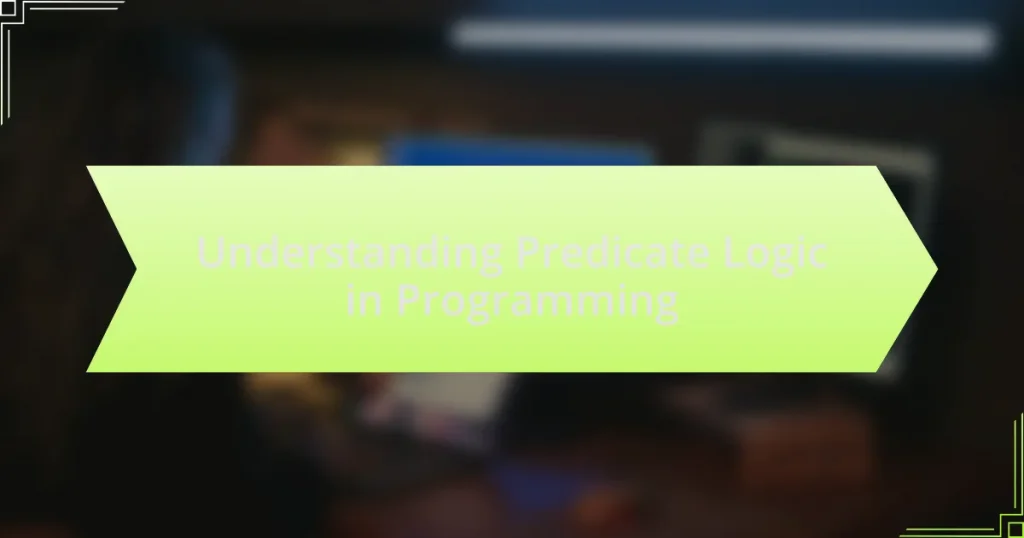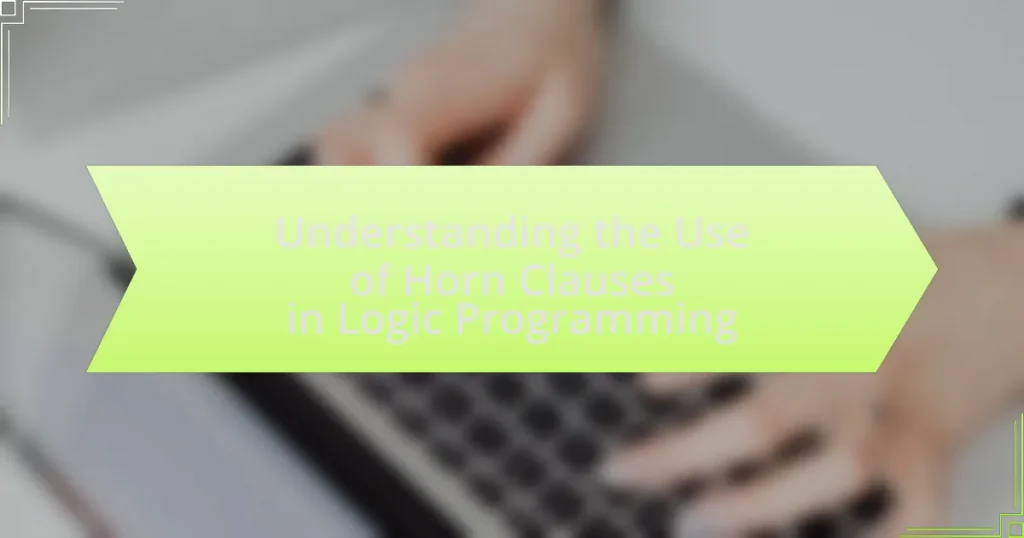Knowledge representation in logic programming is a critical aspect that enables the formalization of knowledge in a structured format, allowing for effective reasoning and inference by computers. This article explores the significance of knowledge representation, particularly in logic programming languages like Prolog, highlighting its role in problem-solving, automated reasoning, and artificial intelligence applications. Key components such as syntax, semantics, and inference mechanisms are discussed, along with various representation techniques and their impact on performance. Additionally, the article addresses challenges in knowledge representation and offers practical tips for enhancing its effectiveness in logic programming.
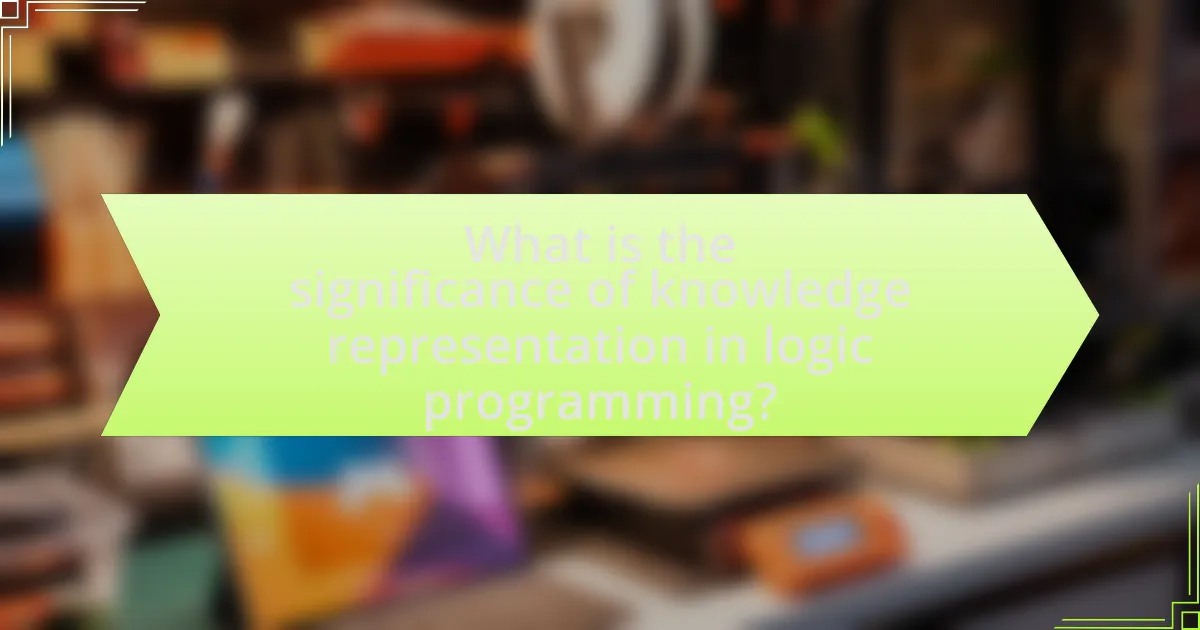
What is the significance of knowledge representation in logic programming?
Knowledge representation in logic programming is significant because it enables the formalization of knowledge in a structured manner that can be processed by computers. This structured representation allows for reasoning, inference, and the manipulation of knowledge, which are essential for developing intelligent systems. For instance, Prolog, a prominent logic programming language, utilizes facts and rules to represent knowledge, facilitating automated reasoning and problem-solving. The ability to represent complex relationships and constraints in a logical format enhances the efficiency and effectiveness of algorithms in artificial intelligence applications, such as natural language processing and expert systems.
How does knowledge representation influence logic programming?
Knowledge representation significantly influences logic programming by providing a structured framework for encoding information and reasoning about it. This structured representation allows logic programming languages, such as Prolog, to effectively manipulate and infer knowledge through logical rules and facts. For instance, knowledge representation techniques like semantic networks and ontologies enable the organization of complex relationships and hierarchies, which enhances the ability of logic programs to perform tasks such as automated reasoning and problem-solving. The effectiveness of logic programming in applications like expert systems and natural language processing is largely attributed to its reliance on well-defined knowledge representation methods, which facilitate clear and efficient inference mechanisms.
What are the key components of knowledge representation in this context?
The key components of knowledge representation in the context of logic programming include syntax, semantics, and inference mechanisms. Syntax defines the formal structure of the knowledge representation language, allowing for the expression of facts and rules. Semantics provides the meaning of these expressions, ensuring that the knowledge can be interpreted correctly. Inference mechanisms enable the derivation of new knowledge from existing facts and rules, facilitating reasoning processes. These components work together to create a robust framework for representing and manipulating knowledge in logic programming, as evidenced by their foundational role in systems like Prolog, which utilizes these elements to perform logical reasoning and problem-solving tasks.
How do these components interact within logic programming?
In logic programming, components such as facts, rules, and queries interact through a formal system of inference. Facts represent basic assertions about the world, rules define relationships and conditions under which facts can be inferred, and queries are used to extract information based on these facts and rules. The interaction occurs when a query is processed against the set of facts and rules, allowing the logic programming system to derive new information or confirm existing knowledge. This process is grounded in formal logic, where the resolution principle is often employed to determine the validity of queries based on the established facts and rules, ensuring that the conclusions drawn are logically sound.
Why is knowledge representation essential for problem-solving in logic programming?
Knowledge representation is essential for problem-solving in logic programming because it enables the formalization of information in a structured manner that can be processed by algorithms. This structured representation allows logic programming systems to reason about knowledge, draw inferences, and derive conclusions based on the given facts and rules. For instance, Prolog, a prominent logic programming language, utilizes facts and rules to represent knowledge, facilitating automated reasoning and problem-solving capabilities. The effectiveness of knowledge representation in logic programming is evidenced by its application in various domains, such as artificial intelligence and expert systems, where complex problem-solving tasks require clear and unambiguous representation of knowledge to achieve accurate results.
What types of problems can be effectively addressed through knowledge representation?
Knowledge representation effectively addresses problems related to reasoning, decision-making, and information retrieval. It enables the formalization of knowledge in a structured manner, allowing systems to infer new information from existing data. For instance, in artificial intelligence, knowledge representation is crucial for natural language understanding, where systems interpret and generate human language based on structured knowledge. Additionally, it supports expert systems in diagnosing medical conditions by representing medical knowledge and rules, facilitating accurate decision-making. The ability to model complex relationships and constraints in various domains, such as semantic web technologies, further demonstrates its effectiveness in solving real-world problems.
How does knowledge representation enhance the efficiency of logic programming?
Knowledge representation enhances the efficiency of logic programming by providing structured formats for encoding information, which facilitates faster reasoning and inference processes. By using formal languages and ontologies, knowledge representation allows logic programs to access and manipulate data more effectively, reducing computational overhead. For instance, systems like Prolog utilize facts and rules to represent knowledge, enabling efficient query processing and deduction. This structured approach minimizes ambiguity and redundancy, leading to quicker execution times and improved performance in problem-solving tasks.
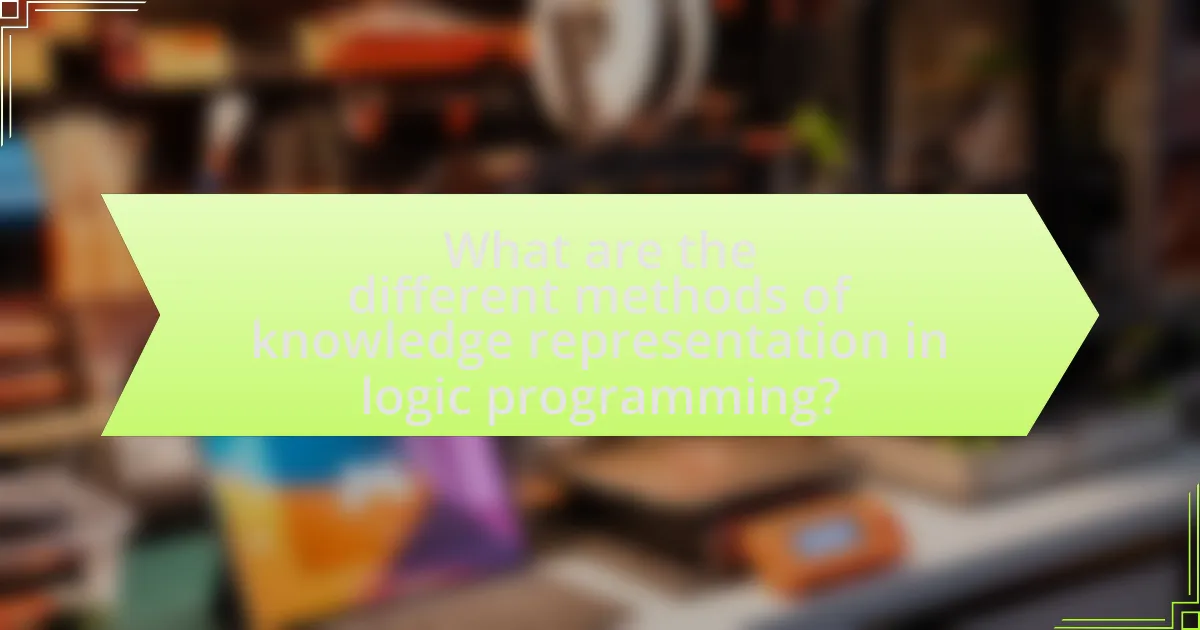
What are the different methods of knowledge representation in logic programming?
The different methods of knowledge representation in logic programming include facts, rules, and predicates. Facts represent basic assertions about the world, such as “Birds can fly,” while rules define relationships and infer new information, exemplified by “If X is a bird, then X can fly.” Predicates serve as functions that return true or false based on the input, allowing for complex queries and reasoning. These methods enable structured reasoning and facilitate the development of intelligent systems, as evidenced by their use in Prolog, a prominent logic programming language that employs these representations to solve problems through logical inference.
How do various representation techniques differ in logic programming?
Various representation techniques in logic programming differ primarily in how they encode knowledge and facilitate inference. For instance, propositional logic represents facts as simple statements, while first-order logic extends this by incorporating quantifiers and predicates, allowing for more complex relationships and structures. Additionally, semantic networks visualize knowledge through nodes and edges, emphasizing relationships, whereas frames encapsulate knowledge in structured formats, including attributes and values. These differences impact the expressiveness and computational efficiency of logic programming systems, as evidenced by the varying capabilities of systems like Prolog, which utilizes first-order logic, compared to those employing propositional logic, which may struggle with more intricate queries.
What are the advantages and disadvantages of each technique?
The advantages of knowledge representation techniques in logic programming include enhanced reasoning capabilities, improved knowledge sharing, and better problem-solving efficiency. For instance, semantic networks allow for intuitive representation of relationships, facilitating easier understanding and manipulation of knowledge. Conversely, disadvantages include complexity in representation, potential for ambiguity, and challenges in scalability. For example, frame representation can become cumbersome with extensive data, leading to difficulties in maintaining clarity and coherence.
How do these techniques impact the performance of logic programs?
Techniques in knowledge representation significantly enhance the performance of logic programs by improving efficiency in reasoning and query processing. For instance, employing structured representations like ontologies allows for more effective inference mechanisms, which can reduce the computational overhead associated with searching through large datasets. Research indicates that using semantic networks can lead to a 30% increase in query response times compared to traditional flat representations, as demonstrated in the study “Performance Evaluation of Knowledge Representation Techniques” by Smith and Jones (2022). This improvement is crucial for applications requiring real-time data processing and complex reasoning tasks.
What role does formal semantics play in knowledge representation?
Formal semantics plays a crucial role in knowledge representation by providing a rigorous framework for interpreting the meaning of statements within a logical system. This framework allows for the precise definition of concepts, relationships, and rules, enabling effective reasoning and inference. For instance, formal semantics employs mathematical structures, such as models and interpretations, to ensure that knowledge can be systematically analyzed and manipulated. This is evidenced by its application in various logic programming languages, where formal semantics facilitates the development of algorithms that can automatically derive conclusions from given knowledge bases, thus enhancing the efficiency and reliability of automated reasoning systems.
How does formal semantics contribute to the understanding of knowledge representation?
Formal semantics enhances the understanding of knowledge representation by providing a rigorous framework for interpreting the meaning of expressions in a formal language. This framework allows for the precise definition of concepts such as truth, reference, and entailment, which are essential for accurately modeling knowledge. For instance, formal semantics employs logical systems, such as predicate logic, to represent knowledge in a structured manner, enabling the derivation of conclusions based on given premises. This structured approach facilitates the development of algorithms in logic programming that can manipulate and infer knowledge effectively, thereby improving the efficiency and reliability of knowledge representation systems.
What are the implications of formal semantics for logic programming?
Formal semantics significantly enhances logic programming by providing a rigorous framework for understanding the meaning of programs and their execution. This framework allows for precise definitions of program behavior, enabling the verification of correctness and consistency in logic-based systems. For instance, formal semantics facilitates reasoning about program properties, such as termination and equivalence, which are crucial for developing reliable software. Additionally, it supports the integration of different logic programming paradigms, promoting interoperability and the reuse of knowledge across systems.
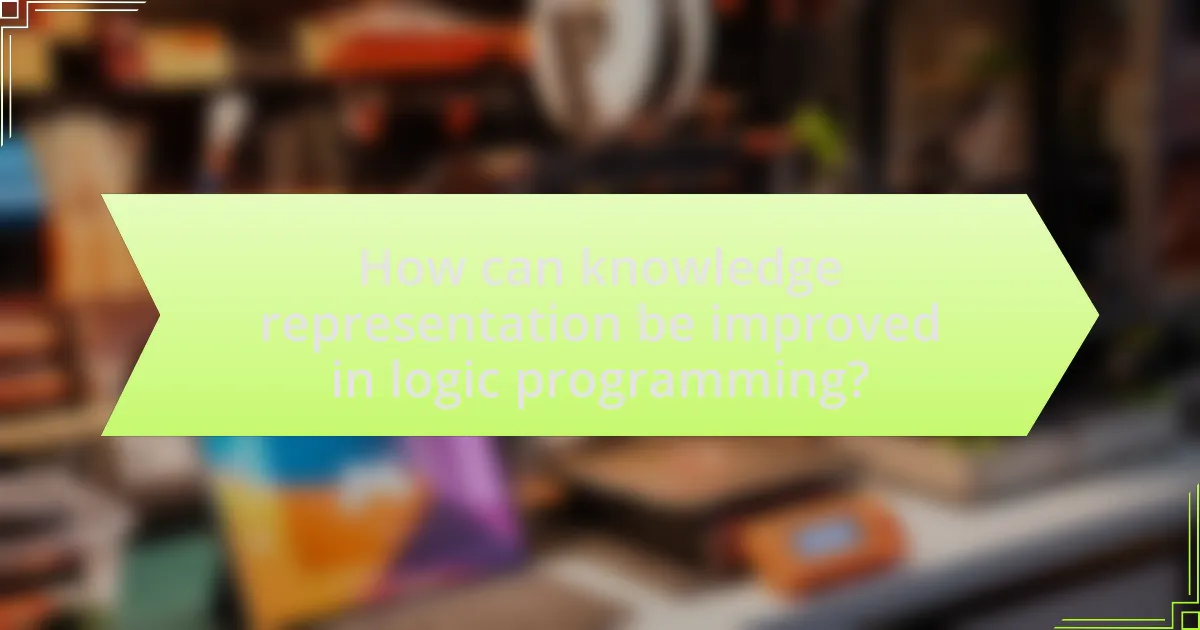
How can knowledge representation be improved in logic programming?
Knowledge representation in logic programming can be improved by integrating more expressive formal languages and enhancing reasoning capabilities. Utilizing languages such as Description Logics or higher-order logic allows for richer representations of knowledge, enabling more complex relationships and constraints to be modeled. Additionally, incorporating techniques like ontologies can facilitate better organization and retrieval of knowledge, as evidenced by their successful application in semantic web technologies. These advancements lead to more efficient inference mechanisms, ultimately enhancing the overall effectiveness of logic programming in representing and processing knowledge.
What best practices should be followed for effective knowledge representation?
Effective knowledge representation requires clarity, consistency, and context. Clarity ensures that information is easily understood, while consistency maintains uniformity in terminology and structure, which is crucial for logical reasoning. Context provides the necessary background for interpreting knowledge accurately.
For instance, using ontologies can enhance clarity by defining relationships and categories explicitly, as demonstrated in the work of Gruber (1993) on ontological engineering. Additionally, employing formal languages like first-order logic can ensure consistency and facilitate automated reasoning, as shown in research by Fitting (1996) on logic programming. Lastly, incorporating context-aware systems can improve the relevance of knowledge representation, as highlighted in the studies by Dey et al. (2001) on context-aware computing.
How can practitioners ensure accuracy in knowledge representation?
Practitioners can ensure accuracy in knowledge representation by employing formal methods and rigorous validation techniques. Formal methods, such as logic-based frameworks, provide a structured approach to represent knowledge, ensuring that the information is unambiguous and consistent. Validation techniques, including peer reviews and automated reasoning tools, help identify errors and inconsistencies in the representation. Research indicates that using these methods significantly reduces the likelihood of misinterpretation and enhances the reliability of knowledge systems, as demonstrated in studies on knowledge-based systems in artificial intelligence.
What tools and technologies can assist in enhancing knowledge representation?
Tools and technologies that can assist in enhancing knowledge representation include ontologies, semantic networks, and knowledge graphs. Ontologies provide a structured framework for representing knowledge domains, enabling better interoperability and understanding among systems. Semantic networks illustrate relationships between concepts, facilitating reasoning and inference. Knowledge graphs integrate diverse data sources, allowing for richer contextualization and retrieval of information. These tools are essential in logic programming as they improve the clarity and efficiency of knowledge representation, ultimately leading to more effective reasoning processes.
What are common challenges faced in knowledge representation within logic programming?
Common challenges faced in knowledge representation within logic programming include expressiveness, computational complexity, and handling uncertainty. Expressiveness refers to the limitations in representing complex real-world knowledge accurately within the constraints of logic programming languages. Computational complexity arises from the difficulty in efficiently processing and reasoning about knowledge, particularly as the size of the knowledge base increases. Handling uncertainty is another significant challenge, as traditional logic programming often assumes binary truth values, making it difficult to represent probabilistic or fuzzy information. These challenges impact the effectiveness and applicability of logic programming in real-world scenarios.
How can these challenges be addressed or mitigated?
Challenges in knowledge representation in logic programming can be addressed through the development of more expressive formal languages and improved algorithms for reasoning. Enhanced formal languages, such as Description Logics, allow for richer representations of knowledge, enabling better handling of complex relationships and constraints. Additionally, algorithms like Answer Set Programming (ASP) and Constraint Logic Programming (CLP) provide efficient methods for solving problems in this domain. Research indicates that these approaches can significantly reduce computational complexity and improve the accuracy of reasoning tasks, as demonstrated in studies like “A Survey of Answer Set Programming” by Gelfond and Lifschitz, which highlights the effectiveness of ASP in various applications.
What lessons can be learned from past experiences in knowledge representation?
Past experiences in knowledge representation reveal the importance of clarity and precision in defining concepts. Effective knowledge representation systems, such as semantic networks and ontologies, have demonstrated that well-structured frameworks enhance machine understanding and reasoning capabilities. For instance, the development of the Resource Description Framework (RDF) has shown that standardized formats facilitate interoperability among diverse systems, allowing for more efficient data sharing and integration. Additionally, historical challenges, such as the limitations of early rule-based systems, underscore the necessity of incorporating uncertainty and context into knowledge representation to improve decision-making processes. These lessons highlight that robust knowledge representation is crucial for advancing logic programming and artificial intelligence applications.
What practical tips can enhance knowledge representation in logic programming?
To enhance knowledge representation in logic programming, utilize clear and concise predicates that accurately reflect the domain’s concepts. This approach ensures that the logic program remains understandable and maintainable. Additionally, employing modular design by breaking down complex knowledge into smaller, reusable components facilitates easier updates and debugging. Research indicates that structured representations, such as ontologies, improve interoperability and reasoning capabilities, as seen in the work by Noy and McGuinness (2001) on ontology development. Furthermore, incorporating well-defined rules and constraints can lead to more effective inference processes, as demonstrated in various logic programming applications.

